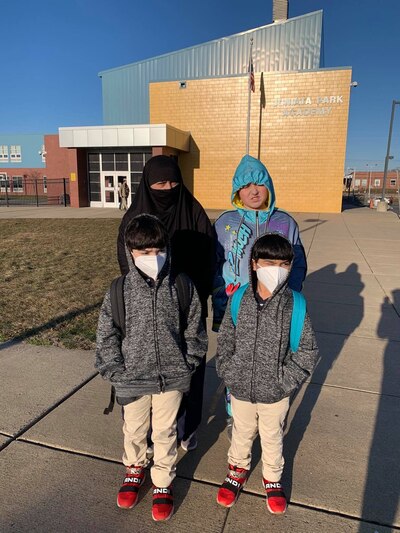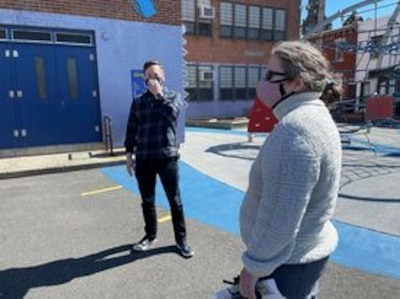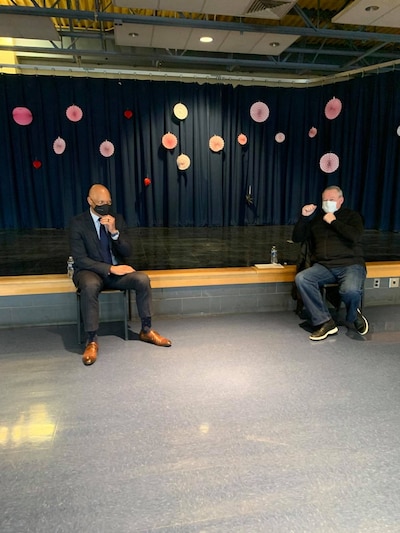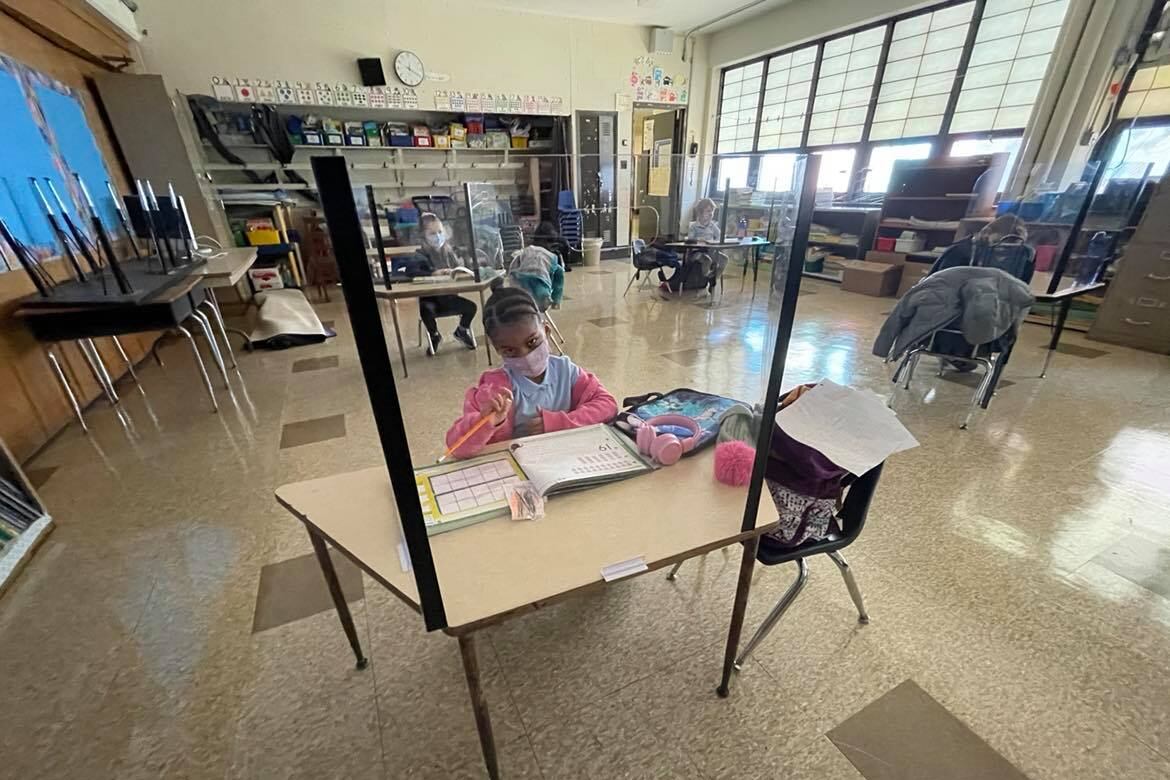Naila Baho and her sons arrived at school 45 minutes early Monday, making them among the first students to return to Philadelphia’s public schools after nearly a year of remote learning.
Shoalb and Sudais Khan, in kindergarten and first grade, stood patiently in the cold at 7:30 a.m. with their older brother, Zohaib, a fifth grader who was not going back but came along to translate.
The family, who emigrated from Pakistan in 2019, hadn’t expected to start their new life in America during a pandemic. Baho said Sudais and Shoalb were excited to go to school so they can make new friends and speak English more often. And not spend all day at the computer.

“Today [they are] very happy,” she said.
Nearly a year after public schools abruptly closed in Philadelphia, some students in prekindergarten to second grade returned to their classrooms Monday. Students at Juniata Park, a kindergarten to eighth grade school in North Philadelphia, were greeted by Mayor Jim Kenney and Superintendent William Hite on their first day of in-person instruction.
Both Hite and Kenney characterized the day as a milestone — a step toward normalcy, if a small one. Neither would say when more students would be invited to return. Hite said he is hoping by the end of the month the district can open the hybrid model to more early-grade students and perhaps add students in some higher grades as well.
“Although the pandemic is far from over, beginning to welcome some of our students back is a little bit of a light at the end of the tunnel,” Hite said. “So we are thrilled to begin doing that.”
The students are returning in three phases beginning with 2,650 students and 53 schools. When all 152 buildings with pre-K through second grade are open — possibly by March 22 — about 9,000 students are expected to attend in-person school two days a week.
The district announced Monday that an additional 45 schools will open for the youngest learners March 15. More schools will be announced on March 15 with their reopening set for March 22.
Teachers, parents, and students at Juniata Park were both excited and a bit apprehensive.
“I’m nervous,” said Jenna Silverman, Juniata Park’s early literacy lead teacher, as she checked in students to make sure they entered through the correct door. But she said she is also ready.
“The teachers here are fabulous, and we did a lot of planning for this,” she said.
Parents also had mixed feelings.
“Obviously I want them to keep them safe, but I don’t want them to fall back when school gets started up again. So I made a personal choice,” said Delaine Martinez, who works in health care, as she dropped off second grader Adriani and kindergartner Cristina. She watched a video of what the socially distanced classroom will look like, which “put my mind at ease. What can I say, it’s part of the new norm.”
Monica Gonzalez said there were “pros and cons” in deciding to have kindergartner Elias and second grader Ethan Cardona go to school in person, but she ultimately decided the pros outweigh the cons.
“Especially Elias, he doesn’t understand the circumstance of sitting in a classroom,” she said.
Silverman said about 60 of the estimated 2,650 students who are returning to district schools this week are at Juniata Park, meaning that 30 or so came Monday. All students are returning in two groups — one on Monday and Tuesday, the other on Thursday and Friday, with Wednesday a virtual day for all.
Jessica Qualtiere, who teaches kindergarten to second grade autism support at Chester Arthur Elementary School in the Graduate Hospital area of South Philadelphia, said much of the assistance in her return to school came from outsiders.

“A lot of the things that you will see in our classrooms were not provided by the district,” she said. “They were from family and community support groups. It’s not a perfect situation. We are trying to flip the positive.”
Philadelphia students are entering a learning environment quite different than the one they left last year. As Chester Arthur students walked from room to room in their first day back, they wore masks and were lined up in the hallway with significant space in-between. Then they sat in classrooms with plexiglass shields attached to their desks.
“My hope for the students in this new learning space is that they feel even more connected to the school and the community,” Mary Libby, the principal of Chester Arthur, said. “I hope they feel loved and supported and understand that we are here going through this new space with them.”
Only one Chester Arthur student who registered to return did not show, Libby said. She noted that all of the school’s teachers returned Monday. “All of the teachers came back,” she said. “Everyone is not vaccinated, but every teacher has had the opportunity to be vaccinated.”
As for when full-time in-person learning might resume for all students districtwide and under what conditions, that is still a huge question mark, dependent on the availability of vaccines and the spread of COVID-19.
Still, “This is truly a great morning,” Kenney said, noting that this time last year the city was taking the unprecedented step of shutting schools down.

Since then, “We’re proud of everything the district did for our students and families during this very difficult period,” Kenney said. “There is no playbook for this pandemic, we did the best we could to meet the needs of our children.”
Hite said teachers did a great job of pivoting from in person to virtual and now to hybrid learning.
“These professionals have been creative, flexible and resilient...and have engaged our students,” he said, also thanking other staff who worked to prepare the buildings.
Kenney said the year has also been hard on parents “and for these reasons and more, I’m so grateful we are able to begin welcoming students back.”
The shift to remote learning for early-grade students has exacerbated concerns across the city about long-term effects on academic achievement, especially for the youngest learners. Kenney said he would favor extending the school year to help students catch up with experiences and learning that they might have missed.
Monday’s reopening is the fourth time since September that the district has attempted to return to some in-person learning. After two false starts in September and November, due to opposition from parents and teachers and a surge in cases of the coronavirus, Hite set a timetable in January for teachers to return on Feb. 8 and students on Feb. 22. That reopening was scrapped after the Philadelphia Federation of Teachers called for third-party mediation over safety issues. The two sides reached an agreement last week.
Many teachers who have been back in their classrooms since last week, however, are complaining on social media of unsanitary conditions and schools that are unprepared and still unsafe for in-person learning.







